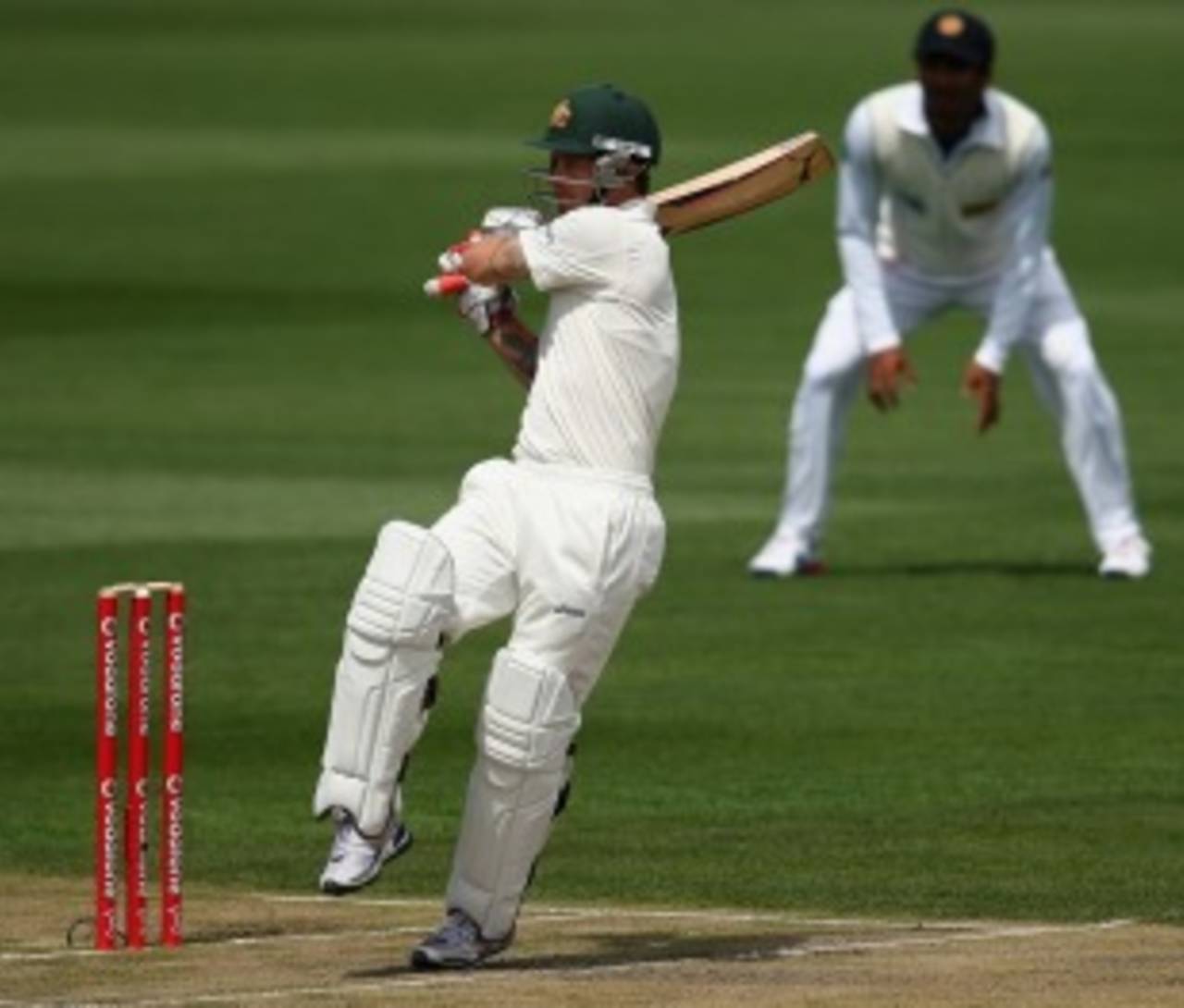Michael Clarke's declaration on the second day conveyed more than mere panache. He may have shirked the accepted threshold for first-innings safety, enhancing a reputation for innovation, but it also issued a bold statement to a vastly experienced Sri Lanka top order: "You are not good enough to reel us in." Sri Lanka's sorry state at stumps is not so staunch a riposte.
There was a time when his opposite number
Mahela Jayawardene was capable of similar bravado, but Clarke's positivity only emphasised Jayawardene's reticence
in Hobart. On day two, he strayed from conservative to something more detrimental as the fielding captain.
Jayawardene was operating on the belief that it could not pay to be over-aggressive given the calibre of the attack in hand but when batsmen are allowed to begin with two sweepers already on the square fence either side of the pitch, they are quickly shorn of the nerves they drag behind them each time they walk to the pitch. As a result, no new batsman - with the exception of opener Ed Cowan - was dismissed cheaply. The closest Sri Lanka came to a double-strike in the first innings was when they dismissed Phil Hughes for 86, 7.3 overs after Clarke had arrived.
There was a time when Jayawardene's leadership was defined by adventure but the spirit has seeped from his mindset in Tests, particularly in the final months of his captaincy. In July, when Sri Lanka had an opportunity to win the final home
Test against Pakistan, Jayawardene ordered a stonewall instead of pursuing an achievable target on the fifth day in Pallekele. Facing a downtrodden New Zealand in
Colombo, his field placings were not far removed from the ones in Hobart, and there Sri Lanka's batsmen hit a wall against a much more positive opposition. At 87 for 4 and 363 runs adrift, another loss looms as the most likely result in the current match, unless Sri Lanka can unearth a good deal of resolve.
Devoid of the menace of Muttiah Muralitharan and the dependability of Chaminda Vaas that Jayawardene could rely on in his first stint at the helm, he perhaps feels he cannot press the steel to the opponent's throat as easily as he once did. And there is merit to that logic, as the attack has suggested so far in the Test.
Nuwan Kulasekara had threatened on the first morning, but even with the modicum of movement the conditions offered, he never looked like taking a wicket. With two men on the hook, Kulasekara tempted Australia's batsmen with the short ball, but at his pace the short stuff was more like hurling matchsticks than breathing fire.
Chanaka Welegedara may have taken three wickets on day one, but the two good balls that dismissed Ed Cowan and Phil Hughes came amid torrents of loose bowling, at a pace well below his best. Both he, and by extension the team, have not been helped by a string of serious injuries this year, and all the talk from the camp before the tour had been about Welegedara's struggle for rhythm in the nets. With no domestic cricket in Sri Lanka in the past few months through which to climb back to Test-match fitness, Welegedara started in Hobart underdone.
"He never got a chance to settle as the Australian batsmen smartly put him under pressure and didn't allow him to get settled," coach Graham Ford said at the end of the day's play. "It was tough for him to come after a long layoff and hit the straps straight away. Looking ahead, hopefully he is going to get back to his best that will help us down the line."
Despite the failure of his bowlers, Jayawardene did not give them the opportunities when they did bowl well. Shaminda Eranga improved as the innings wore on, and was clearly the best bowler in Sri Lanka's pack on the second day, but the fields he bowled to were the same supplied to the other seam bowlers. He produced perhaps the ball of the innings to dismiss one of the most in-form batsmen in the world in Michael Clarke, but when Matthew Wade walked in, the square sweepers remained at their posts, instead of advancing to the ring to squeeze a mistake from the batsman. Having eased his tension into the open spaces, Wade duly flourished. Ford defended his captain, alluding to an attack that "doesn't blow batsmen away" and as a result, a "gameplan that takes time". But Mahela's best captaincy has come when he has had a finger pressed firmly to the pulse of a game and each duck, weave and lunge is inspired by instinct. In Hobart and Colombo he let rigidity sweep in, and the team has not worn that shackle well.
Jayawardene is in his last series at the helm, and perhaps another tilt with administrators - who range from incompetent to diabolical - has worn him down. These are not problems that any other captain must confront as depressingly often as Jayawardene. But on a day when Clarke refused to respect Sri Lanka's batsmen, Jayawardene failed to give his own team the respect they deserved.
